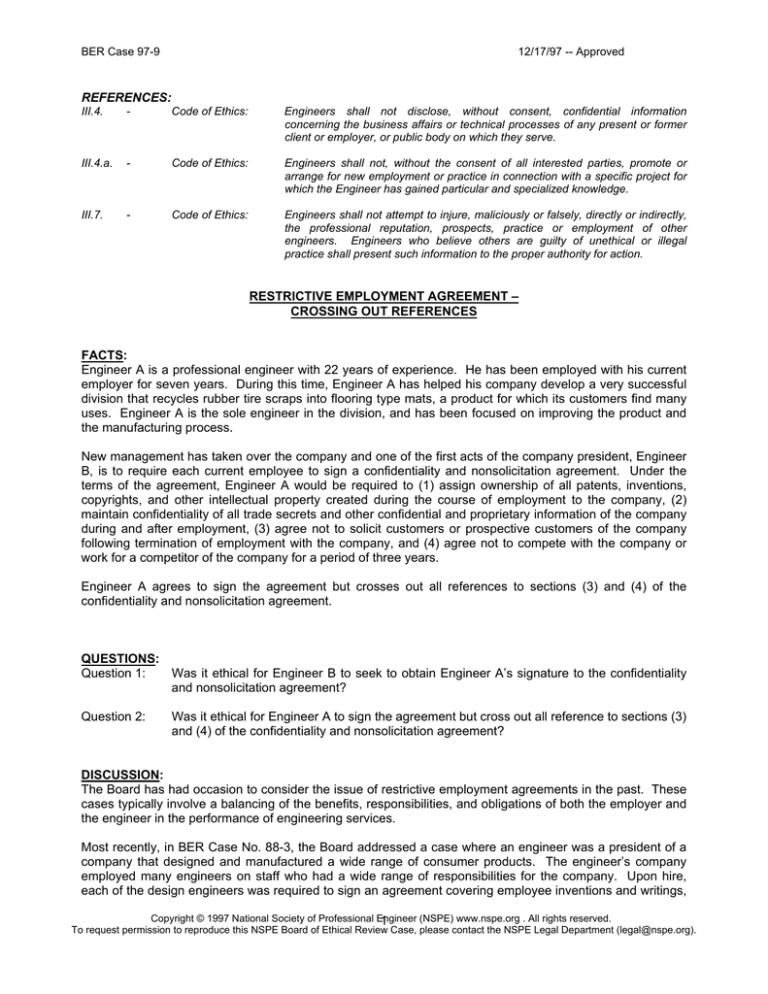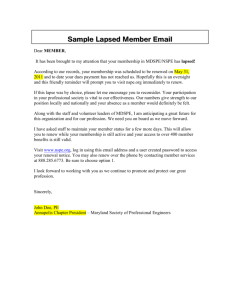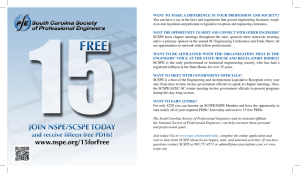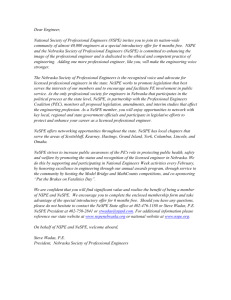
BER Case 97-9
12/17/97 -- Approved
REFERENCES:
III.4.
-
Code of Ethics:
Engineers shall not disclose, without consent, confidential information
concerning the business affairs or technical processes of any present or former
client or employer, or public body on which they serve.
III.4.a.
-
Code of Ethics:
Engineers shall not, without the consent of all interested parties, promote or
arrange for new employment or practice in connection with a specific project for
which the Engineer has gained particular and specialized knowledge.
III.7.
-
Code of Ethics:
Engineers shall not attempt to injure, maliciously or falsely, directly or indirectly,
the professional reputation, prospects, practice or employment of other
engineers. Engineers who believe others are guilty of unethical or illegal
practice shall present such information to the proper authority for action.
RESTRICTIVE EMPLOYMENT AGREEMENT –
CROSSING OUT REFERENCES
FACTS:
Engineer A is a professional engineer with 22 years of experience. He has been employed with his current
employer for seven years. During this time, Engineer A has helped his company develop a very successful
division that recycles rubber tire scraps into flooring type mats, a product for which its customers find many
uses. Engineer A is the sole engineer in the division, and has been focused on improving the product and
the manufacturing process.
New management has taken over the company and one of the first acts of the company president, Engineer
B, is to require each current employee to sign a confidentiality and nonsolicitation agreement. Under the
terms of the agreement, Engineer A would be required to (1) assign ownership of all patents, inventions,
copyrights, and other intellectual property created during the course of employment to the company, (2)
maintain confidentiality of all trade secrets and other confidential and proprietary information of the company
during and after employment, (3) agree not to solicit customers or prospective customers of the company
following termination of employment with the company, and (4) agree not to compete with the company or
work for a competitor of the company for a period of three years.
Engineer A agrees to sign the agreement but crosses out all references to sections (3) and (4) of the
confidentiality and nonsolicitation agreement.
QUESTIONS:
Question 1:
Was it ethical for Engineer B to seek to obtain Engineer A’s signature to the confidentiality
and nonsolicitation agreement?
Question 2:
Was it ethical for Engineer A to sign the agreement but cross out all reference to sections (3)
and (4) of the confidentiality and nonsolicitation agreement?
DISCUSSION:
The Board has had occasion to consider the issue of restrictive employment agreements in the past. These
cases typically involve a balancing of the benefits, responsibilities, and obligations of both the employer and
the engineer in the performance of engineering services.
Most recently, in BER Case No. 88-3, the Board addressed a case where an engineer was a president of a
company that designed and manufactured a wide range of consumer products. The engineer’s company
employed many engineers on staff who had a wide range of responsibilities for the company. Upon hire,
each of the design engineers was required to sign an agreement covering employee inventions and writings,
Copyright © 1997 National Society of Professional Engineer
(NSPE) www.nspe.org . All rights reserved.
1
To request permission to reproduce this NSPE Board of Ethical Review Case, please contact the NSPE Legal Department (legal@nspe.org).
BER Case 97-9
12/17/97 -- Approved
confidential information, and noncompetitive employment. The engineer decided to include in the agreement
the following clause:
“In the event that my employment with the company is terminated without regard to whether
such termination is voluntary or involuntary, I agree that for a period of eighteen months after
termination, I will not, directly or indirectly, become employed by or render any services of an
advisory nature or otherwise, or participate or engage in any business competitive with the
company’s business without first receiving the prior written consent of the company. I further
agree to notify the company in writing during this noncompete time period of any offers of
employment received from a competitor or possible competitor of the company by me at
least two weeks prior to the commencement of any such employment. The company will
inform me as to whether it consents to such employment by mailing a registered letter within
three working days of receipt of notification to my last known address. In the event the
company does not consent to the providing of services or employment or a competitor
during the noncompete period, the company agrees to pay me on a monthly basis at the rate
of one-third of my last monthly salary with the company, starting with the time of denying
consent and up to a maximum time period of eighteen months, to coincide with the
noncompete time period, as consideration for my not participating or engaging in any
business competitive with the company’s business.”
After carefully evaluating this restrictive provision, as well as an earlier opinion, BER Case No. 72-5, which
involved an engineer in private practice subject to a restrictive employment agreement, the Board laid out a
basis for evaluating such provisions. The Board reasoned that the appropriate method of evaluating these
provisions is by measuring its the provision’s reasonableness in terms of time, scope, and manner. In terms
of the clause in BER Case No. 88-3, the Board determined that the agreement was not reasonably limited as
to time because, although it would only bind the employee for a period of eighteen months, it would apply to
an employee who worked for the company for one month as it would to an employee who worked for the
company for ten years. As to scope, the agreement was not limited in terms of geography (e.g., to a city or
state). Instead, the provision would apply to all world-wide operations of the company. The Board
determined that the provision was inherently unfair because it would require former engineer employees of
the company who had developed a particular technical expertise to remain unemployed for a period of
eighteen months and collect one-third compensation. The Board noted that any agreement which by its
terms forces an engineer to remain out of work is in direct violation of Section III.7 of the NSPE Code of
Ethics because it clearly injures the prospects or employment of another engineer. Finally, the agreement
was not narrowly limited to any substantive area of company operations but applied broadly to all aspects of
company activities. For example, under the provision, an employee would not be permitted to accept a
position with a competitor even if the competitor planned to assign the employee to a division whose
activities and functions had no connection with the employee’s previous activities. We believe the Board’s
analysis in Case No. 88-3 is relevant and easily applicable to the case presently before us.
As we noted in the earlier cases, engineers in industry are frequently privy to highly confidential information,
trade secrets, patented products and processes, and other highly valued material and data. Therefore, it is
arguable that engineering employers should be permitted a wider scope in utilizing restrictive employment
agreements. In today’s economy, confidential information including client information, marketing techniques,
and business associations may be some of the most highly valued data possessed by an engineering
company.
Turning to the facts of this case, the Board finds certain parts of the agreement being proposed by the
employer to be more restrictive than the agreement provision in Case No. 88-3. It should first be said,
however, that clause sections (1) and (2) are not objectionable because they are consistent with the NSPE
Code of Ethics, law, and the general custom and practice within the engineering profession. Clause section
(3) is generally not prohibited by the NSPE Code of Ethics unless it involves confidential information
concerning the business affairs or technical processes of a present or former client or employer and is done
without consent. However, clause section (4) would appear be too broad because it would apply to all
employed engineers in the company regardless of their tenure with the company and would be binding on
the employed engineers (including Engineer A) for three years without limitation. Unlike the agreement in
Copyright © 1997 National Society of Professional Engineer
(NSPE) www.nspe.org . All rights reserved.
2
To request permission to reproduce this NSPE Board of Ethical Review Case, please contact the NSPE Legal Department (legal@nspe.org).
BER Case 97-9
12/17/97 -- Approved
Case No. 88-3, under which an individual would only be bound for eighteen months and receive some limited
compensation if offered a position by a competitor, this agreement would appear to totally bar any
employment with a competitor for a period of three years under any circumstances. In addition, much like
the agreement in Case No. 88-3, this agreement is not bound in any way by any geographic limitation.
Instead, the agreement would appear to apply to any competitor in the world. Also, like the provision in Case
No. 88-3, clause section (4) would, in essence, force a knowledgeable engineer to remain unemployed in his
or her area of expertise or be hired by a company that does not compete with the employer, for a period of
three years following termination of employment, regardless of the cause of employment termination. We
believe this is unreasonable and on that basis believe that it would be unethical for Engineer B to seek to
obtain Engineer A’s signature on the confidentiality and nonsolicitation agreement as it is presently worded.
Turning to the second issue in this case, as we noted earlier, since the action referred to in section (3) is
generally not prohibited by the NSPE Code of Ethics unless it involves confidential information concerning
the business affairs or technical processes of a present or former client or employer and is done without
consent, we believe it was appropriate for Engineer A to strike out the provision in the agreement. As an
employee, another approach for Engineer A to consider would have been to attempt to discuss and
negotiate a change to clause sections (3) and (4) and possibly other provisions in the proposed
confidentiality agreement. As stated earlier, employers, particularly industrial employers, have legitimate
business interests in maintaining the confidentiality of information possessed by their employees and,
therefore, a balanced approach would seem to be the best course to pursue. However, crossing out
language seems to be ethical, professional, and in keeping with the NSPE Code of Ethics as well as prior
Board of Ethical Review opinions.
CONCLUSIONS:
Question 1:
It was not ethical for Engineer B to seek Engineer A’s signature to the confidentiality and
nonsolicitation agreement in the manner described.
Question 2:
It was ethical for Engineer A to sign the agreement but cross out all reference to sections (3)
and (4) of the confidentiality and nonsolicitation agreement.
BOARD OF ETHICAL REVIEW
James G. Fuller, P.E.
William E. Norris, P.E.
Paul E. Pritzker, P.E.
Richard Simberg, P.E.
Jimmy H. Smith, P.E., Ph.D.
C. Allen Wortley, P.E.
Donald L. Hiatte, P.E., Chairman
NOTE: The NSPE Board of Ethical Review (BER) considers ethical cases involving either real or
hypothetical matters submitted to it from NSPE members, other engineers, public officials
and members of the public. The BER reviews each case in the context of the NSPE Code of
Ethics and earlier BER opinions. The facts contained in each case do not necessarily
represent all of the pertinent facts submitted to or reviewed by the BER.
Each opinion is intended as guidance to individual practicing engineers, students and the
public. In regard to the question of application of the NSPE Code of Ethics to engineering
organizations (e.g., corporations, partnerships, sole-proprietorships, government agencies,
university engineering departments, etc.), the specific business form or type should not
negate nor detract from the conformance of individuals to the NSPE Code. The NSPE Code
deals with professional services -- which services must be performed by real persons. Real
persons in turn establish and implement policies within business structures.
Copyright © 1997 National Society of Professional Engineer
(NSPE) www.nspe.org . All rights reserved.
3
To request permission to reproduce this NSPE Board of Ethical Review Case, please contact the NSPE Legal Department (legal@nspe.org).
BER Case 97-9
12/17/97 -- Approved
This Opinion is for educational purposes only. It may be reprinted without further permission,
provided that this statement is included before or after the text of the case and that
appropriate attribution is provided to the National Society of Professional Engineers’ Board of
Ethical Review.
Visit the “Ethics Button” on NSPE’s website (www.nspe.org) and learn how to obtain complete
volumes that include all NSPE Opinions (or call 1-800-417-0348).
Copyright © 1997 National Society of Professional Engineer
(NSPE) www.nspe.org . All rights reserved.
4
To request permission to reproduce this NSPE Board of Ethical Review Case, please contact the NSPE Legal Department (legal@nspe.org).





